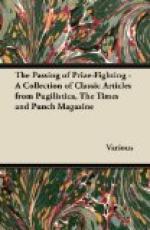Their Christian hearts sweetly suffused with sudden meekness, the Bishops proceed—staff in hand, and Bible under arm—from Lambeth Palace. How the people make way for the holy procession! Hackney-coachmen on their stands uncover themselves, and the drayman, surprised in his whistle, doffs his beaver to the reverend pilgrims. With measured step and slow, they proceed to Downing-street; the self-deputed Missionaries, resolved to give her Majesty’s ministers “a Christian education.” Sir ROBERT PEEL is immediately taken in hand by the Bishop of EXETER; who sets the Baronet to learn and exemplify the practical beauties of the Lord’s Prayer. When Sir ROBERT comes to “give us this day our daily bread,” he insists upon adding the words “with a sliding scale.” However, EXETER, animated by a sudden flux of Christianity, keeps the baronet to his lesson, and the Premier is regenerated; yea, is “a brand snatched from the fire.”
Lord LYNDHURST makes a great many wry mouths at some parts of the Decalogue—we will not particularise them—but the Bishop of London is resolute, and the new Lord Chancellor is, in all respects a bran-new Christian.
Lord STANLEY begs that when he prays for power to forgive all his enemies, he may be permitted to except from that prayer—DANIEL O’CONNELL. The Bishop is, however, inexorable; and O’Connell is to be prayed for, in all churches visited by Lord STANLEY.
Several of the bishops, smitten by the heathen darkness of the great majority of the Cabinet—affected by their utter ignorance of the practical working of Christianity—burst into tears. It will not be credited by those disposed to think charitably of their fellow-creatures, that—we state the melancholy fact upon the golden word of the Bishop of EXETER—several Cabinet ministers had never heard of the divine sentence which enjoins upon us to do to others as we would they should do unto us. Sir JAMES GRAHAM, for instance, declared that he had always understood the passage to simply run—“Do others;” and had, therefore, in very many acts of his political life, squared his doings according to the mutilated sentence. All the Cabinet had, more or less, some idea of the miracle of the Loaves and the Fishes. Indeed, many of them confessed that with them, the Loaves and the Fishes had, during their whole political career, contained the essence of Christianity. Sir EDWARD KNATCHBULL, Lord ELLENBOROUGH, and GOULBURN declared that for the last ten years they had hungered for nothing else.




